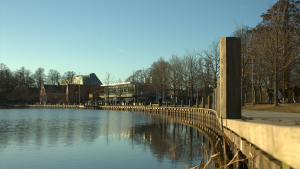is collaborating with British Columbia educators to funnel their mass timber knowledge into a new microcredential program.
EllisDon director of construction sciences Mark Gaglione said the microcredential program originated with the (BCIT) who engaged David Moses, the principal of to assist in writing curriculum before reaching out to EllisDon in 2022.
“Moses’ perspective was the design of mass timber. They were looking for a group to help them with the construction aspects as they were trying to establish the microcredential course to help people get up to speed on a bit of design, a bit of construction,” Gaglione said. “It would be an applied course where students got to build a tiny structure at the end.”
Gaglione, who is based in Toronto, said EllisDon was erecting several mass timber buildings across Canada and continues to do so, “so we’re looked at for that expertise and actually a lot of the course content ended up being derived from our site photos, document and schedules.”
EllisDon director of construction sciences Vincent Davenport said the company moved early into mass timber construction due to changing building codes with B.C. and Ontario in the lead.
“When that shifted, clients started asking if there were additional opportunities in lower-density parcels of land where they could use mass timber, and those questions started coming to our senior management team,” he said.
“Mark and I are leaders in a very technical group within EllisDon and advise all over the country, and honestly at the time we knew nothing (about mass timber).
“We spent a number of years figuring it out, speaking with others who have built with mass timber in the U.S., Europe and others who have been building with it longer, met with suppliers to figure out who is manufacturing mass timber products and scoured Canada and Europe to build relationships with engineers and architects who were familiar (with the material),” he said.
“As opportunities started coming we were able to take all that knowledge gathering and put it into practice,” he said, citing projects like Centennial College, Humber College and T3 Sterling in Toronto.
Davenport said going through such an intensive learning period helped define their approach to the microcredential course.
“Once you go through it you realize what’s really important and it helped us to focus our energy and try to provide the students with the key bits of knowledge that will be useful for them when they go work for an installation company or work for an architect,” he said.
EllisDon engaged in three sections of the course, Gaglione said: planning for mass timber construction, installation and the integration of other components with a mass timber build.
“We fed all our precedent experience into that because we had done a lot of installation, planning, made a bunch of mistakes and we were able to highlight that as lessons learned for the coursework. We even developed a couple of multiple-choice tests in the end,” he said.
Davenport added when he and Gaglione attended engineering courses at the University of Toronto they found information on mass timber builds lacking and that BCIT has made significant progress regarding mass timber education.
“BCIT are leaders in this space of trying to educate the next generation for this emerging technology that probably should play a bigger role in our built environment,” he said. “They were really the first to see this as a knowledge gap and do something about it.”
The course is conducted online and is open to non-students with one year of experience in carpentry, ironworking, construction management building inspection, design, development, manufacturing and estimating.
More information about the course and registration is available .











Recent Comments
comments for this post are closed